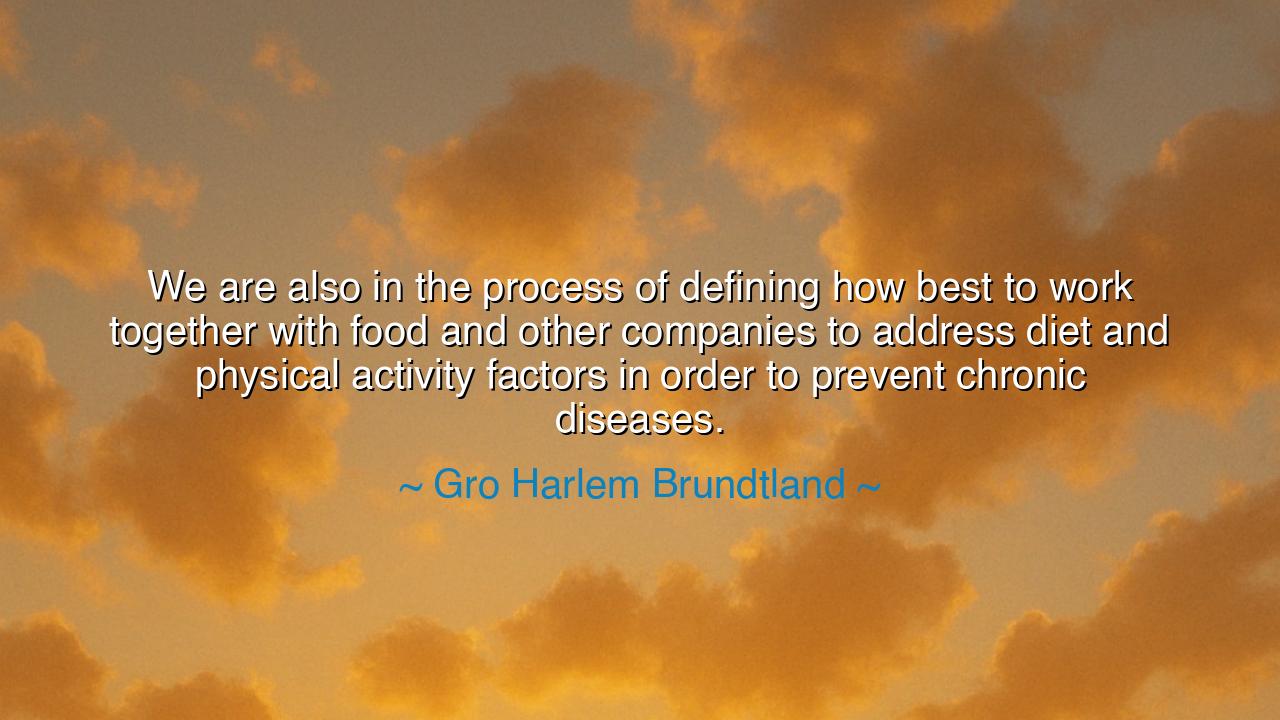
We are also in the process of defining how best to work together
We are also in the process of defining how best to work together with food and other companies to address diet and physical activity factors in order to prevent chronic diseases.






When Gro Harlem Brundtland declared, “We are also in the process of defining how best to work together with food and other companies to address diet and physical activity factors in order to prevent chronic diseases,” she spoke not only as a physician and world leader, but as a guardian of human balance. Beneath her words lies a vision that transcends policy and reaches into the soul of civilization—the recognition that the health of a people is a reflection of how they live, eat, move, and collaborate. Her statement is both scientific and sacred: it calls upon humanity to rediscover the unity between nourishment, motion, and morality, and to restore harmony to a world disordered by excess and neglect.
In her time as Director-General of the World Health Organization, Brundtland stood at the crossroads of two ages—the industrial and the ecological, the age of production and the age of prevention. She understood that the greatest battles of the modern world are not fought with weapons, but with habits; that chronic diseases—heart disease, diabetes, obesity—are not born in the chaos of war, but in the quiet choices of everyday life. Her words remind us that health is no longer an individual pursuit but a collective responsibility, and that the bond between government, business, and citizen must be rebuilt upon the principles of wisdom, compassion, and shared purpose.
The ancients, too, understood this law of balance. In the writings of Hippocrates, the father of medicine, we find the maxim: “Let food be thy medicine, and medicine be thy food.” But in the modern age, food has become both poison and profit. The very companies that feed humanity have learned to profit from its weakness—crafting abundance that breeds disease, and luxury that sows decay. Brundtland’s words thus carry the moral weight of a reformer: she calls for a reunion between health and industry, a sacred pact to turn the engines of production toward the service of life rather than its diminishment.
Her call to “work together” recalls the spirit of the ancient city-states, where health was seen as the foundation of civic virtue. The Greeks believed that a strong body led to a clear mind, and that the flourishing of the individual was bound to the flourishing of the polis. Likewise, Brundtland’s wisdom teaches that the fate of nations is written not only in their laws and armies but in their diet and physical activity—the unseen rituals of daily living that shape the destiny of societies. When the people move together—literally and figuratively—they become resilient. When they stagnate, they fall.
Consider the example of ancient Rome, whose early citizens lived simply, laboring in the fields and training in discipline. In that age, vigor and virtue were intertwined. But as the empire grew rich, its people grew idle, their tables heavy with luxury, their bodies soft, their will weakened. Historians say that Rome fell not only from invasion but from degeneration—its strength consumed by its own appetite. Brundtland’s warning echoes across millennia: a civilization that forgets moderation, that divorces profit from health, walks the same path to ruin.
Yet her message is not one of despair, but of renewal. The power to heal lies not in miracle but in cooperation. She calls upon the leaders of nations and the stewards of industry to see themselves not as rivals, but as partners in the restoration of life. The merchant, the policymaker, the farmer, and the teacher—all are threads in the same tapestry. If they work in harmony, the world can reclaim its vitality. If they act in isolation or greed, the fabric unravels. Her vision is one of unity through purpose, a reminder that healing begins when human ambition bends to the rhythm of nature and compassion.
And so, the lesson endures: health is the truest form of wealth, and prevention is its greatest wisdom. Every choice—every meal, every motion, every policy—either builds the strength of the world or erodes it. To live well is to live consciously, and to govern well is to guide others toward that consciousness. Let each person, each company, each nation heed Brundtland’s words: eat with respect for the Earth, move with respect for the body, and act with respect for the generations to come. For when humanity learns again to live in balance, the world will not merely survive—it will thrive in harmony, as it was always meant to.






AAdministratorAdministrator
Welcome, honored guests. Please leave a comment, we will respond soon